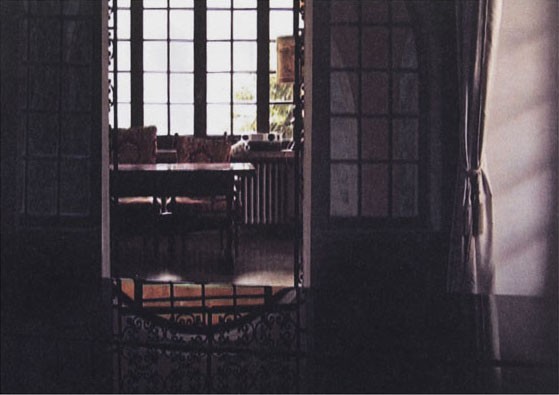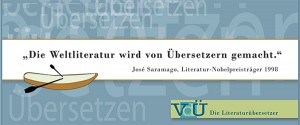An Interview with Daniel Laufer
You can buy a wide variety of works of art from our art vending machine. One such piece is a postcard by Daniel Laufer (*1975, Hanover).
The card shows a film still from the video, “The Fourth Wall” (at 08:13 min). The story is based on an Hasidic parable about two men who are supposed to design one half of a house. While the first man does his work with zeal, the second delays, uninspired. The second man, who is certain that he won’t come up with a better idea than his rival, decides to coat his work with black bitumen. The material will reflect the other half of the house like a mirror. Thus he discovers a good solution to avoid defeat.

Postcard with still shot from the film “The Fourth Wall” by Daniel Laufer
© Jewish Museum Berlin, photo: Jens Ziehe
The film was shown this year at the 14th Videonale at the Bonn Art Museum.
In the following interview, Daniel Laufer talks about the genesis and message of his postcard.
Christiane Bauer: Daniel, you work mostly in video form. Yet you produced a postcard for the art vending machine. Why did you choose this format?
Daniel Laufer: A postcard is something mobile that you can take with you. It connects you to something: it provides information and contains a message. It can be a souvenir – but with a statement. And I also like the fact that you can hang it on the wall.
The original work of art is an entire film. Why did you choose this particular shot as a motif for the postcard? → continue reading
– a Youth Spent in Iran and Vienna
This week, from 21 to 27 October 2013, the Academy of the Jewish Museum Berlin, in cooperation with Kulturkind e.V., will host readings, workshops, and an open day for the public with the theme “Multifaceted: a book week on diversity in children’s and youth literature.” Employees of various departments have been vigorously reading, discussing, and preparing a selection of books for the occasion. Some of these books have already been introduced here over the course of the last months.

In her autobiographical graphic novel Persepolis, the author Marjane Satrapi, born in 1969, portrays the history of her native Iran as well as that of her own family. The two are closely interwoven. Marjane grew up in Iran during a time of upheaval: when she was ten, the Shah was overthrown and people danced in the streets. But the feeling of liberation was brief. Soon the new religious regime began to enforce its ideas of morality and decency. It forbade alcohol and Western music, insisted that even non-religious women wear the veil, and put opponents into prison or had them assassinated. Marjane’s open-minded, liberal parents are understanding and give her space and freedom. But she finds it difficult to adjust to the rules outside their home. She rebels against the dress codes, goes to parties, and argues with her teachers. → continue reading
On Behind-the-scenes Labor in the Cultural Economy

“Translators create universal literature.” José Saramago, Nobel Prize Winner for Literature 1998
© VdÜ (Germany’s Union of Literary Translators), design: Christian Hoffmann
Today is Giornata mondiale della traduzione, Międzynarodowy Dzień Tłumacza, Journée mondiale de la traduction, Uluslararası Çeviri Günü or Día Internacional de la Traducción—which is to say, International Translation Day, an occasion established in 1991 by the Fédération Internationale des Traducteurs (FIT: International Federation of Translators) in order to raise public awareness of the cultural impact of the wordsmith’s trade. 30 September is the anniversary of the death in 420 CE of Hieronymus, who translated the Hebrew Bible into Latin. Since ancient times translation has influenced the target language in question, and in the globally networked world of today it is our constant companion. Germany’s Union of Literary Translators (VdÜ) puts it in a nutshell: “Wherever words have been spoken, written, read, or even sung, translators have had a finger in the pie, and indeed they still do; and it is thanks to them that the whole world is at home in its own language.” → continue reading


